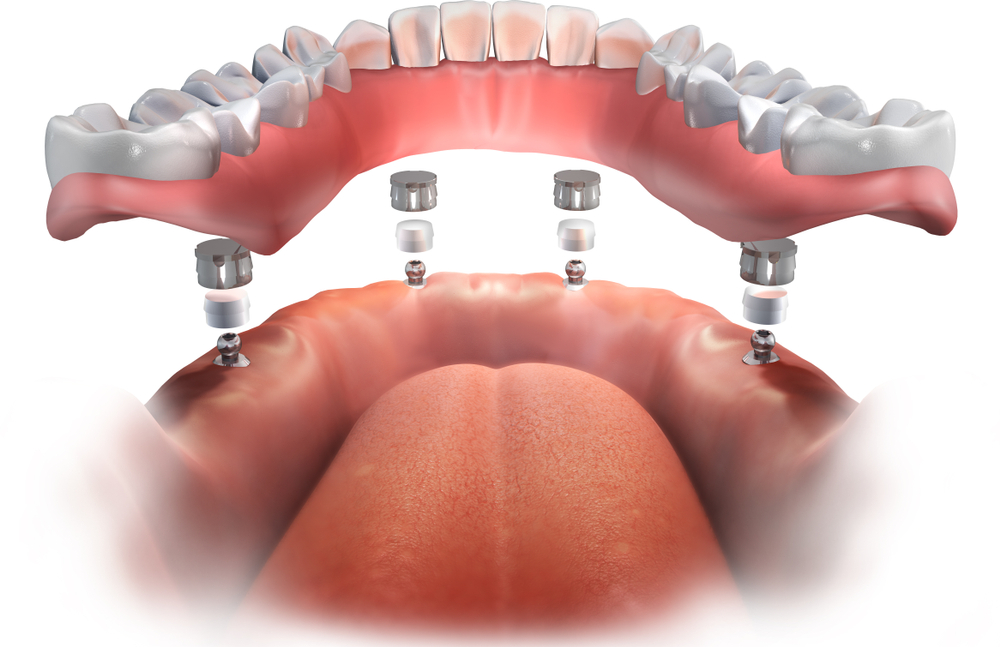Lower denture implants have become a popular solution for individuals struggling with traditional lower dentures. Unlike conventional dentures, which can slip and cause discomfort, implants provide a secure and stable foundation for dentures, improving functionality and confidence.
This guide will explore everything you need to know about lower denture implants, including how they work, their benefits, the procedure, and how they can improve your quality of life.
What Are Lower Denture Implants?
Lower denture implants are a type of overdenture that is supported by dental implants. Dental implants are titanium posts surgically placed into the jawbone to serve as anchors for the dentures.
Traditional lower dentures often move or slip due to the lack of natural suction in the lower jaw. Implants solve this issue by securely anchoring the dentures, providing greater stability and comfort.
How Do Lower Denture Implants Work?
The process involves placing two or more dental implants into the lower jaw. These implants act as anchors for the dentures, which snap or clip onto them. The dentures can be removable or fixed, depending on your preferences and the dentist’s recommendations.
- Removable Dentures: These can be taken out for cleaning and maintenance.
- Fixed Dentures: These are permanently attached to the implants and function like natural teeth.
Benefits of Lower Denture Implants
1. Improved Stability
Implants eliminate the common issue of loose or wobbly lower dentures, allowing you to eat and speak with confidence.
2. Better Comfort
Implant-supported dentures are more comfortable because they don’t press on the gums like traditional dentures.
3. Enhanced Chewing Ability
With secure dentures, you can enjoy a wider variety of foods without worry.
4. Preservation of Jawbone
Implants stimulate the jawbone, preventing bone loss that often occurs with traditional dentures.
5. Long-Term Durability
With proper care, dental implants can last a lifetime, making them a long-term solution.
The Procedure for Lower Denture Implants
1. Consultation and Planning
Your dentist or oral surgeon will evaluate your oral health, take X-rays, and create a treatment plan tailored to your needs.
2. Implant Placement
Titanium implants are surgically placed into the jawbone. The number of implants varies, but two to four implants are commonly used for lower dentures.
3. Healing Period
The implants require a healing period of several months to integrate with the jawbone in a process called osseointegration.
4. Denture Attachment
Once the implants are fully integrated, the dentures are attached to the implants using snaps or clips.
5. Follow-Up Care
Regular dental visits are essential to ensure the implants and dentures remain in excellent condition.
Are You a Candidate for Lower Denture Implants?
Most individuals who are missing all their lower teeth are good candidates for denture implants. However, you may need to meet certain criteria:
- Adequate Jawbone: Sufficient bone is necessary to support the implants. Bone grafting may be an option for those with bone loss.
- Good Oral Health: Healthy gums and no untreated infections are crucial for successful implantation.
- Commitment to Maintenance: Regular oral hygiene and dental checkups are essential.
Cost Considerations
The cost of lower denture implants depends on factors such as the number of implants, the type of dentures, and the need for additional procedures like bone grafting. While implants may be more expensive upfront, their long-term benefits often outweigh the initial investment.
Caring for Lower Denture Implants
Proper care is crucial to ensure the longevity of your implants and dentures:
- Daily Cleaning: Clean the dentures and implants as instructed by your dentist.
- Avoid Hard Foods: Chewing excessively hard items can damage the dentures.
- Regular Dental Visits: Schedule routine checkups to monitor the health of your implants and gums.
- Quit Smoking: Smoking can interfere with the healing process and increase the risk of implant failure.
Advantages Over Traditional Dentures
| Feature | Traditional Dentures | Lower Denture Implants |
| Stability | May slip or move | Secure and stable |
| Comfort | Can irritate gums | Minimal gum pressure |
| Chewing Efficiency | Limited | Improved |
| Jawbone Preservation | None | Prevents bone loss |
| Long-Term Durability | Requires replacement | Long-lasting |
Richmond Hill Smile Centre: Your Trusted Partner in Emergency Dental Care
When a dental emergency strikes in Richmond Hill, Richmond Hill Smile Centre is the clinic you can rely on for top-tier care. Conveniently located at 10157 Yonge St Unit 101, Richmond Hill, ON L4C 1T6, Richmond Hill Smile Centre is known for its prompt, compassionate, and expert handling of dental emergencies. Whether you’re dealing with a severe toothache, a broken tooth, or another urgent dental issue, the skilled team at Richmond Hill Smile Centre is ready to assist you.
Contact Richmond Hill Smile Centre at +1 647-362-4755 or via email at info@richmondhillsmilecentre.ca to receive the immediate care you need. Their dedicated team is committed to providing quick and effective treatment to alleviate pain and protect your dental health.
FAQs About Lower Denture Implants
1. How long do lower denture implants last?
With proper care, the implants can last a lifetime. The dentures may need replacement every 5–10 years.
2. Is the procedure painful?
The procedure is performed under local anesthesia, so you won’t feel pain during surgery. Some discomfort may occur during recovery, but it’s manageable with prescribed medications.
3. How many implants are needed for lower dentures?
Typically, two to four implants are sufficient to support lower dentures. Your dentist will determine the appropriate number based on your case.
4. Can I switch from traditional dentures to implant-supported dentures?
Yes, most patients can transition from traditional dentures to implant-supported ones after a consultation with their dentist.
5. Are lower denture implants removable?
Both removable and fixed options are available. Removable dentures can be taken out for cleaning, while fixed dentures remain attached to the implants.
Conclusion
Lower denture implants are a revolutionary solution for anyone frustrated with the instability of traditional lower dentures. They offer enhanced stability, comfort, and functionality, allowing you to eat, speak, and smile confidently.
If you’re considering lower denture implants, consult with a dental professional to determine if you’re a suitable candidate. With proper care and maintenance, lower denture implants can provide a durable and life-changing solution for missing teeth.



